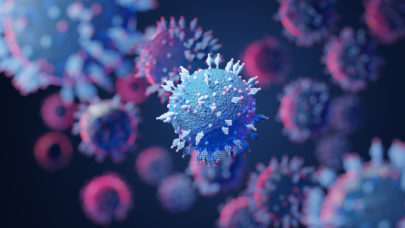
Gordon Bell Nominee Used LLMs, HPC, Cerebras CS-2 to Predict Covid Variants
November 17, 2022
Large language models (LLMs) have taken the tech world by storm over the past couple of years, dominating headlines with their ability to generate convincing hu Read more…

Argonne Supercomputing, ML Power ‘IMPECCABLE’ Drug Discovery
September 15, 2022
Two and a half years later, much of the world has settled into an uneasy routine with Covid-19 thanks to a host of highly effective vaccines and a handful of ef Read more…

Argonne Talks AI Accelerators for Covid Research
April 28, 2022
As the pandemic swept across the world, virtually every research supercomputer lit up to support Covid-19 investigations. But even as the world transformed, the Read more…

Pfizer Discusses Use of Supercomputing and AI for Covid Drug Development
March 24, 2022
Over 16 months ago, Pfizer achieved a historic scientific moonshot — the unprecedentedly swift development and authorization of a novel vaccine for a novel virus using methods that hitherto had not been used in approved drugs at scale. Throughout the pandemic, nearly every public research supercomputer pivoted to some form of Covid research... Read more…

Los Alamos’ Chicoma Supercomputer to Host 75 New Projects
March 17, 2022
In late 2020, Los Alamos National Laboratory (LANL) — which operates under the Department of Energy’s National Nuclear Security Administration (NNSA) — co Read more…

Summit Supercomputer Used to Model Classroom Covid Spread
March 10, 2022
As the world’s students return to classrooms, a general unease remains over the dynamics of Covid transmission even as the omicron variant settles into a lull Read more…

Argonne Supercomputer Powers Air Travel Covid-19 Research
March 9, 2022
The world is (once again) returning to some semblance of pre-pandemic life as the omicron variant wanes. Many are now wondering about the risk calculus for popu Read more…

AWS-Powered Research Identifies 130,000+ New RNA Viruses
February 8, 2022
Beyond the immediate investigations surrounding new variants and pharmaceuticals, the Covid-19 pandemic is raising the profile of another crucial, anxiety-induc Read more…

- Click Here for More Headlines

Whitepaper
Transforming Industrial and Automotive Manufacturing
In this era, expansion in digital infrastructure capacity is inevitable. Parallel to this, climate change consciousness is also rising, making sustainability a mandatory part of the organization’s functioning. As computing workloads such as AI and HPC continue to surge, so does the energy consumption, posing environmental woes. IT departments within organizations have a crucial role in combating this challenge. They can significantly drive sustainable practices by influencing newer technologies and process adoption that aid in mitigating the effects of climate change.
While buying more sustainable IT solutions is an option, partnering with IT solutions providers, such and Lenovo and Intel, who are committed to sustainability and aiding customers in executing sustainability strategies is likely to be more impactful.
Learn how Lenovo and Intel, through their partnership, are strongly positioned to address this need with their innovations driving energy efficiency and environmental stewardship.
Download Now
Sponsored by Lenovo
Whitepaper
How Direct Liquid Cooling Improves Data Center Energy Efficiency
Data centers are experiencing increasing power consumption, space constraints and cooling demands due to the unprecedented computing power required by today’s chips and servers. HVAC cooling systems consume approximately 40% of a data center’s electricity. These systems traditionally use air conditioning, air handling and fans to cool the data center facility and IT equipment, ultimately resulting in high energy consumption and high carbon emissions. Data centers are moving to direct liquid cooled (DLC) systems to improve cooling efficiency thus lowering their PUE, operating expenses (OPEX) and carbon footprint.
This paper describes how CoolIT Systems (CoolIT) meets the need for improved energy efficiency in data centers and includes case studies that show how CoolIT’s DLC solutions improve energy efficiency, increase rack density, lower OPEX, and enable sustainability programs. CoolIT is the global market and innovation leader in scalable DLC solutions for the world’s most demanding computing environments. CoolIT’s end-to-end solutions meet the rising demand in cooling and the rising demand for energy efficiency.
Download Now
Sponsored by CoolIT
Advanced Scale Career Development & Workforce Enhancement Center
Featured Advanced Scale Jobs:
HPCwire Resource Library
HPCwire Product Showcase
© 2024 HPCwire. All Rights Reserved. A Tabor Communications Publication
HPCwire is a registered trademark of Tabor Communications, Inc. Use of this site is governed by our Terms of Use and Privacy Policy.
Reproduction in whole or in part in any form or medium without express written permission of Tabor Communications, Inc. is prohibited.
























